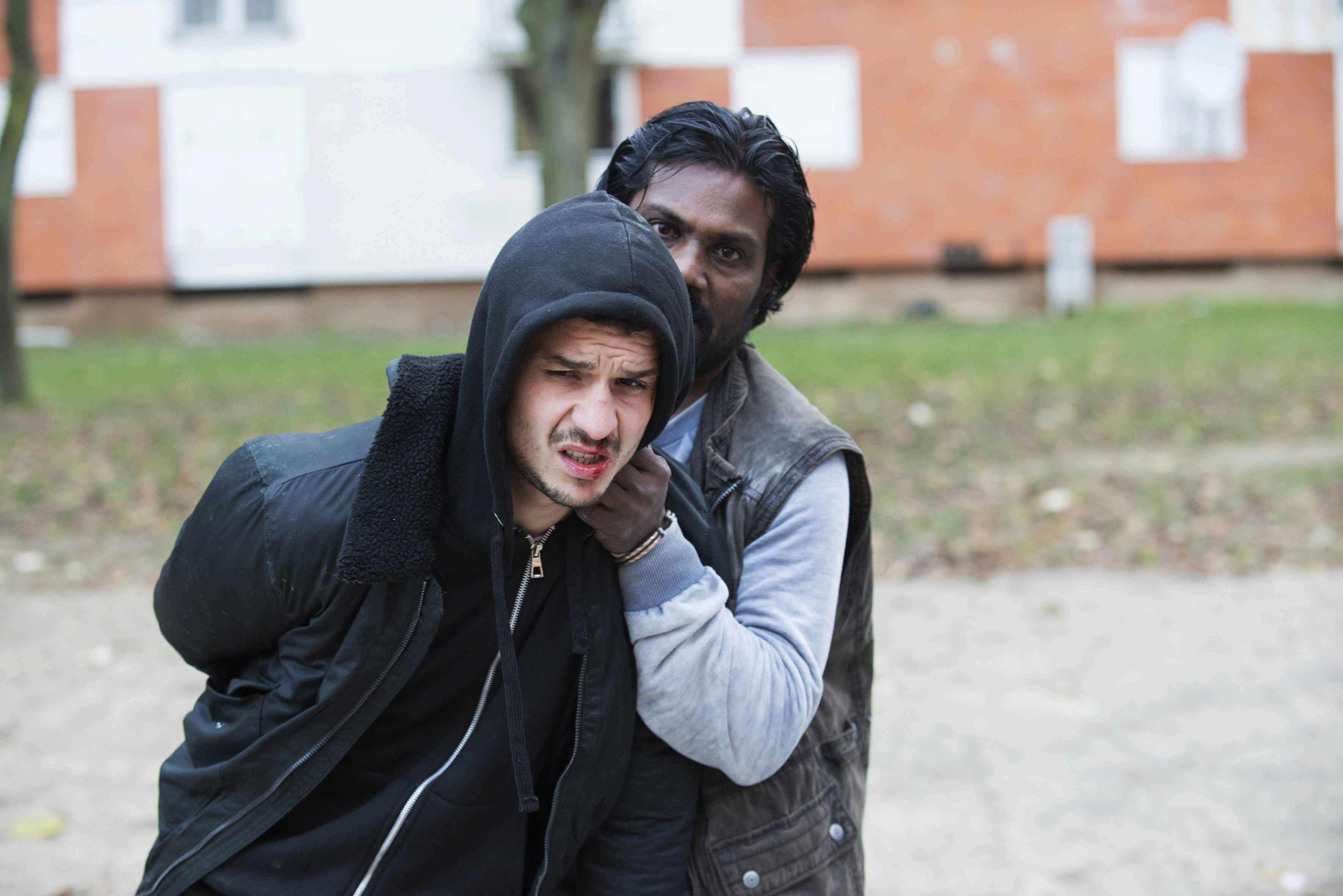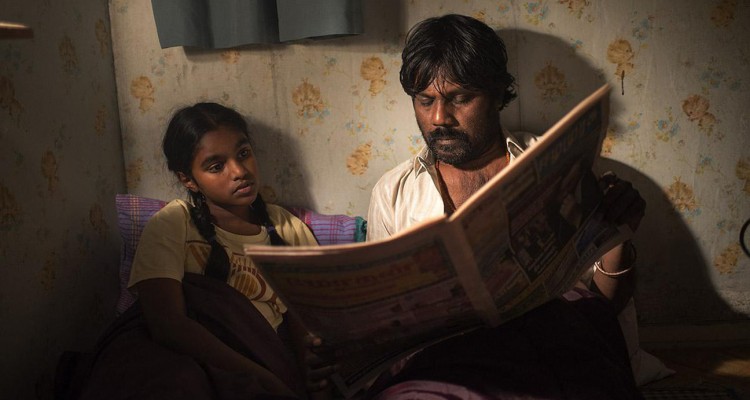This is a reprint of our review from the 2015 Cannes Film Festival.
The last decade or so has seen Jacques Audiard establish himself as one of the best, and best known, French filmmakers currently working. He first gained international attention with 2001’s “Read My Lips,” and then with the terrific “The Beat That My Heart Skipped” in 2005. But it was 2009’s prison epic “A Prophet” that really made his name by winning the Grand Prix at Cannes, picking up an Oscar nomination and becoming a cult hit worldwide.
2012’s melodrama “Rust and Bone” continued the trend, with stellar reviews and awards buzz, bringing him to his largest audience yet, thanks to the presence of megastar Marion Cotillard. His follow-up, however, marks something of a return to his roots, a lower-budget drama starring a cast of unknowns, while simultaneously feeling like new territory. It’s also absolutely terrific, and one of the strongest things he’s made so far, a film containing all Audiard’s strengths and few of his weaknesses. At least until the last few minutes, but we’ll get to that…
 Co-written with “A Prophet” and “Rust and Bone” writer Thomas Bidegain, along with Noé Debré, the film picks up in Sri Lanka, as Yalini (Kalieaswari Srinivasan) searches a settlement for a young girl without any parents. She eventually finds Illayaal (Claudine Vinasithamby), and brings her to a man she’s just met, where they’re given new passports and get on a boat to leave. They are all Tamils, an ethnic minority in the country who fought for an independent nation, only to be defeated in a war ending in 2009, and the man now known as Dheepan (Antonythasan Jesuthasan) was a top soldier in the militant group, the Tamil Tigers.
Co-written with “A Prophet” and “Rust and Bone” writer Thomas Bidegain, along with Noé Debré, the film picks up in Sri Lanka, as Yalini (Kalieaswari Srinivasan) searches a settlement for a young girl without any parents. She eventually finds Illayaal (Claudine Vinasithamby), and brings her to a man she’s just met, where they’re given new passports and get on a boat to leave. They are all Tamils, an ethnic minority in the country who fought for an independent nation, only to be defeated in a war ending in 2009, and the man now known as Dheepan (Antonythasan Jesuthasan) was a top soldier in the militant group, the Tamil Tigers.
This makeshift family are granted asylum in France, where Dheepan, haunted by the war and the death of his real wife and child, finds work and accommodation as a caretaker in a rundown housing project dominated by drug dealers. Yalini gets a job too, as the aide and cook to the disabled uncle of the local ganglord Brahim (Vincent Rottiers), while Illayaal tries to adjust to a new school in a foreign country. They initially make strides in finding a new life, but when the bullets start flying, Dheepan decides to take a stand.
 Audiard has never shied away from depicting multiculturalism, but “Dheepan” marks the first time that he’s directly confronted the immigrant experience, and it brings out something new in the helmer. We spend only a little time in Sri Lanka, but the characters’ longing for home, and their hope for a new life, drives the film, and there’s real detail and empathy in the way that the film tackles the journey of its protagonists.
Audiard has never shied away from depicting multiculturalism, but “Dheepan” marks the first time that he’s directly confronted the immigrant experience, and it brings out something new in the helmer. We spend only a little time in Sri Lanka, but the characters’ longing for home, and their hope for a new life, drives the film, and there’s real detail and empathy in the way that the film tackles the journey of its protagonists.
The title is slightly misleading, in that the film’s focus is on all three of its central characters (though I was a little disappointed that Illyayaal takes a backseat in the second half, given the terrific performance by newcomer Vinasithamby). Dheepan is perhaps more eager to fit in and embrace French culture because of the horrors that he’s suffered, and perhaps perpetrated, while Yalini is more reluctant, younger than him at just 26 years old, struggling to pick up a new language, and suddenly dumped with a fake husband and child.
 Both of the lead actors are superb (both are relative newcomers: Jesuthasan is an acclaimed novelist, Srinivasan is an Indian theater actress in her first film role), and their fledgling, faltering romance, reminiscent of “The Americans” in its depiction of a sham marriage that leads to actual, complex feelings, is a tender highlight and a vivid heartbeat of the picture. It’s a far more successful love story than the one in “Rust & Bone,” and while the film retains Audiard’s trademark muscularity, it’s also the most compassionate and humanistic thing he’s made to date.
Both of the lead actors are superb (both are relative newcomers: Jesuthasan is an acclaimed novelist, Srinivasan is an Indian theater actress in her first film role), and their fledgling, faltering romance, reminiscent of “The Americans” in its depiction of a sham marriage that leads to actual, complex feelings, is a tender highlight and a vivid heartbeat of the picture. It’s a far more successful love story than the one in “Rust & Bone,” and while the film retains Audiard’s trademark muscularity, it’s also the most compassionate and humanistic thing he’s made to date.
Post-screening buzz suggested that some critics have taken issue with the film’s final act, which returns to more traditional genre territory for the filmmaker, as Dheepan makes his stand in defense of his family. I didn’t have such an issue with it however, as the shift hardly comes from nowhere. Audiard brings a sense of inevitable momentum as the film starts to wrap up, and Dheepan, standing up for the family he’s accidentally found (who may not want the help) after he couldn’t save his real one, makes sense. Perhaps it’s the extreme way in which Audiard films the sequence (including an impressive long shot at calf-level) that people take issue with, but it again felt appropriate for the film and character: Dheepan has exchanged one war for another, and by heightening the scene, it puts the viewer further into his head. I’ll acknowledge that the picture’s closing minutes were the film’s major disappointment however, an over-neat coda that doesn’t feel earned.
 Otherwise, the movie looks and sounds great. The photography, by impressive newcomer Eponine Momenceau, results in some of the most memorable images of the festival, while the score from Electronica artist Nicolas Jaar is excellent. This really is Audiard operating at the top of his game, mostly dropping the contrivances of “Rust & Bone” for incisive character studies and a deeply humane, almost warm, worldview, and the result is certainly one of the highlights of the Cannes competition this year. [A-]
Otherwise, the movie looks and sounds great. The photography, by impressive newcomer Eponine Momenceau, results in some of the most memorable images of the festival, while the score from Electronica artist Nicolas Jaar is excellent. This really is Audiard operating at the top of his game, mostly dropping the contrivances of “Rust & Bone” for incisive character studies and a deeply humane, almost warm, worldview, and the result is certainly one of the highlights of the Cannes competition this year. [A-]

